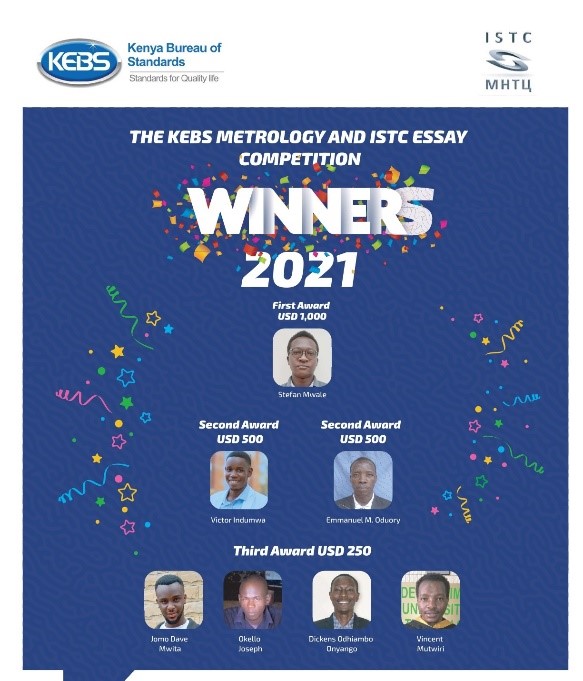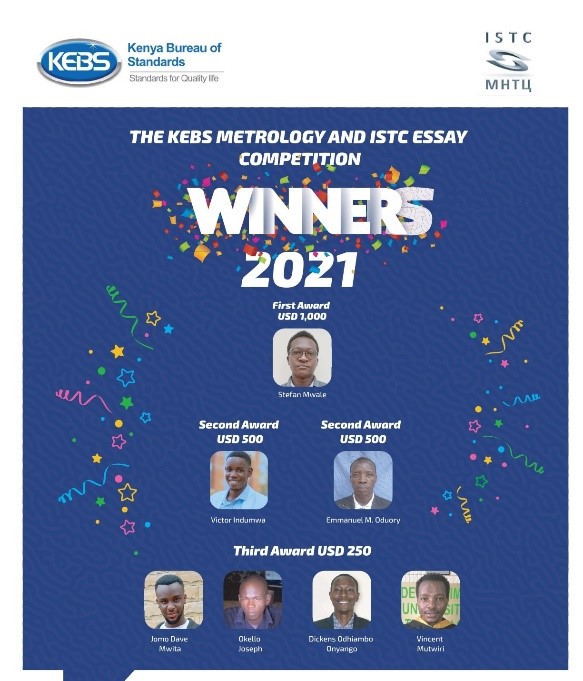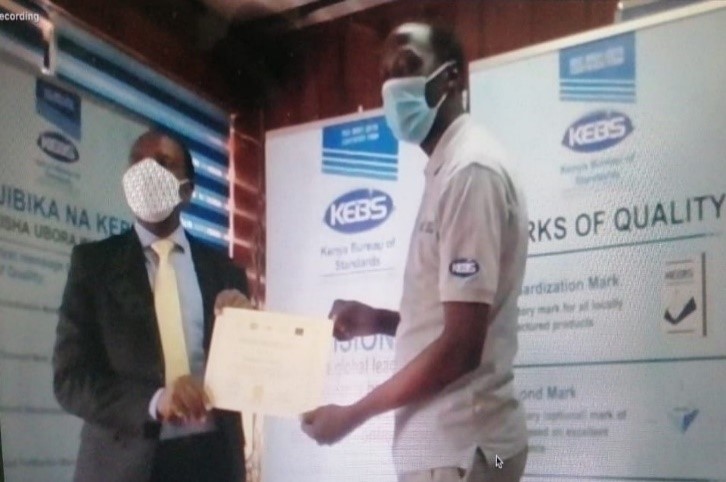Ceremony in Nairobi for awarding certificates to the winners of the ISTC – KEBS Essay Competition

 On 20 December 2021 at the Kenyan Bureau of Standards Headquarters in Nairobi, Kenya, an award ceremony took place at which certificates were presented to the winners of the ISTC–KEBS Essay Competition on the topic ‘How international cooperation can boost research and development in my area of expertise?’ Kenya is about to accede as a new State Party to the International Science and Technology Centre (ISTC) from Africa. The competition was launched to celebrate this event.
On 20 December 2021 at the Kenyan Bureau of Standards Headquarters in Nairobi, Kenya, an award ceremony took place at which certificates were presented to the winners of the ISTC–KEBS Essay Competition on the topic ‘How international cooperation can boost research and development in my area of expertise?’ Kenya is about to accede as a new State Party to the International Science and Technology Centre (ISTC) from Africa. The competition was launched to celebrate this event.
A total of thirty-five essays were submitted by contestants across Kenyan academia, research institutes and individual experts. ISCT, Kenya Bureau of Standards (KeBS), Eastern Africa Association of Radiation Protection (EAARP), Kenya Young Generation in Nuclear and National Commission for Science, Technology and Innovation (NACOSTI) provided assessors for the submitted essays. A good number of submissions examined the topic comprehensively and added that networking on matters related to nuclear science and technology would alleviate challenges Kenya and other African countries face.
The winner of the competition is Stefan Mwale, final year student in mechanical engineering at Dedan Kimathi University of Technology in Nyeri, Kenya. In his essay he wrote, inter alia: ‘… the activities of the European Union are evidence that the global approach to research and innovation(R&I) can help in fighting climate change and pandemics … by facilitating bilateral cooperation between Europe and the rest of the world to amplify knowledge and pool resources for R&I”.
 The runners up were Emmanuel Oduory, from Multimedia University of Kenya, Mentor, Coach & Trainer @ Compassion Intl, Nairobi, and Victor Indumwa, a student in control and instrumentation engineering at Jomo Kenyatta University of Agriculture and Technology. The former proposed a project entitled: "Synthesis, characterization and applications of climate-smart biochar-zeolite adsorbents for simultaneous removal of selected heavy metals, pesticides, pharmaceuticals and aqueous nuclear wastes". The latter advocated international cooperation through the African Network for Education in Nuclear Science and Technology (AFRA NEST) and suggested that Kenya should undertake research on using nuclear energy for seawater desalination.
The runners up were Emmanuel Oduory, from Multimedia University of Kenya, Mentor, Coach & Trainer @ Compassion Intl, Nairobi, and Victor Indumwa, a student in control and instrumentation engineering at Jomo Kenyatta University of Agriculture and Technology. The former proposed a project entitled: "Synthesis, characterization and applications of climate-smart biochar-zeolite adsorbents for simultaneous removal of selected heavy metals, pesticides, pharmaceuticals and aqueous nuclear wastes". The latter advocated international cooperation through the African Network for Education in Nuclear Science and Technology (AFRA NEST) and suggested that Kenya should undertake research on using nuclear energy for seawater desalination.
Other laureates received a third prize for their contributions. Jomo Dave Mwita, a fourth year student in mechanical engineering, pointed out in his essay that ‘the European Cooperation in Science and Technology (COST), established in 1971, with its current policy still valid today, enables engineering scientists to cooperate on specific research problems through joint action of researchers who would not otherwise meet or have sufficient resources available for individual cross-border projects’. Okello Joseph from the Technical University of Kenya proposed strategies to consider in boosting research and development in scientific metrology. Dickens Onyango argued in favor of the setting up of small modular reactors (SMRs) across the three major cities in Kenya: Nairobi, Mombasa and Kisumu. Vincent Mutwiri who is finishing his studies in industrial chemistry at Dedan Kimathi University explained in his essay that: “for long the battle to fight disease by finding cure has been left to pharmaceutical companies in African countries. But less than 2% of drugs consumed in Africa are produced on the continen’.
At the ceremony KEBS Managing Director Dr. H. Rotich, Dr. David Otwoma, ISTC point of contact, and Dr. Kamen Velichkov, ISTC SPM and DA made remarks on the importance and the outcomes of the Essay Competition. Currently Kenya participates in two projects implemented by ISTC – Support to the EU ECA Center of Excellence in Nuclear Security and Support to African countries in biosafety. Speaking on behalf of the laureates, Stefan Mwale pledged the support of the new generation of experts for the launch and conduct of many more ISTC projects in the not so distant future.

